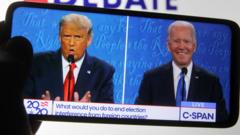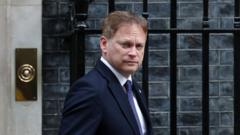In the span of four hours on Wednesday, a plan to hold two presidential debates between Joe Biden and Donald Trump went from rumour to reality.
While some details still need to be hammered out, it appears the Democratic and Republican candidates will face off twice, on 27 June and 10 September. Usually the debates are in September and October.
Mr Trump, who has for months been calling for a debate “anytime, anywhere”, got what he wanted. Mr Biden, meanwhile, got to set the terms of their meetings.
Now we have an idea of the agreed terms, here’s a closer look at how the debates could benefit, or damage, the two campaigns.
The president had been coy about whether he was ever going to debate his Republican opponent. But if he had taken a pass, he would have been the first president since Richard Nixon in 1972 to skip the debate process entirely.
Given that there have been repeated questions about his age and competency to serve another four years in office, a move to sidestep the presidential face-offs would have risked convincing the public that he was not up to the task.
As it was, he was able to set the terms of the debate in a way that could be to his advantage. The two events will be hosted by CNN and ABC News, and not Fox News, avoiding a debate moderator with a clear right-wing tilt.
The June debate will be held in CNN’s Atlanta studios with no live audience, which also may play better for the president, whose crowds have been



















































